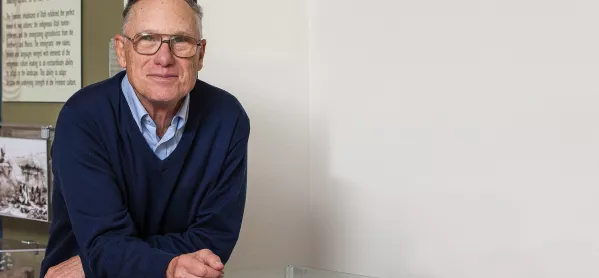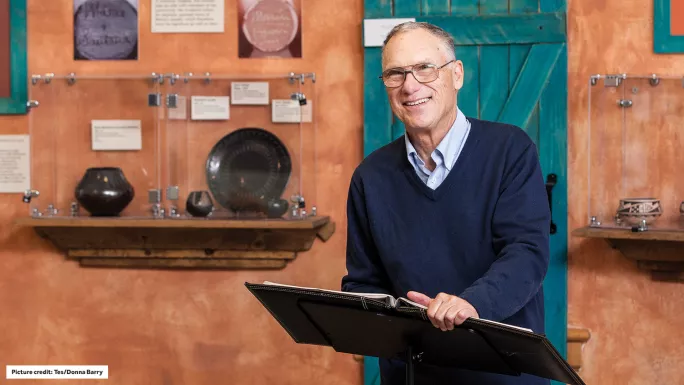- Home
- #ToYouFromTes: Tes talks to...David F Lancy
#ToYouFromTes: Tes talks to...David F Lancy

We’re not raising children properly. That’s the view of anthropologist David F Lancy. And the wrong things we are doing, he says, are being increasingly pushed in schools in the UK - for example, offering praise too easily.
“We have this notion of raising each child as special and unique and patting them on the back for every achievement, to protect their self-esteem,” he says.
Lancy is a professor of anthropology at Utah State University and has carried out extensive research on children and their development across a range of different cultures, which all fed into his most recent book Raising Children: Surprising Insights from Other Cultures. He describes it as a guide to raising children for all intelligent adults, rather than just for parents. Which, as he explains, also means there is a great deal that teachers can apply.
The central theme of the book is that the ways in which we look at children and their development and our thoughts about how to raise them are much more driven by culture than by nature. “The basis on which I make that statement is to introduce childhood models and child-rearing models from other parts of the world,” says Lancy. “Showing that our way of doing things is not only not the norm, but in many ways we’re an outlier. [Actually], in most ways, we’re outliers.”
“Our” way, he calls WEIRD - which stands for Western, Educated, Industrialised, Rich and Democratic. And it has some defining characteristics.
“I think one of the drivers [of this] is this underlying notion that children should never be unhappy and that if they are, that’s a problem that the parent is maybe responsible for and certainly has an obligation to remediate.” says Lancy.
“I might need to coin a term that talks about parents being totally wrapped up and centred on their children. This is one of the greatest accomplishments of their life, if not the greatest. That is the burden that many carry. If you don’t get this right, you’re pretty much a failure in life. So, so much is invested in optimising the child and making it perfect. Both from the notion that that’s what the child wants and that you’re doing the best for your child.”
No pedestals
This approach, Lancy says, is problematic. “You can relate all sorts of things to that, including the spectacular rise of psychotropic medication being given to children,” he states. “I take the idea that putting kids on a pedestal is not a good thing - and from that, I develop an essay in the book on ‘failure to launch’. When you put a child on a pedestal and say, ‘The horizons are limitless for you, my child, you can do anything you want to do, there’s no hurry, you can take your time,’ that creates a situation that you say to your kids, ‘You don’t have to conform to society’s expectations or expectations of the workplace, you can continue to do what’s exciting and wonderful for you,’ and we end up with kids still living at home at 25 and only patchily employed.”
It’s not only parents, but also society that can create these issues - and schools can be just as culpable of these attitudes, he says. Children need the courage and the space to be able to make mistakes in school, Lancy argues.
Schools can create further problems, too, he says, by too closely controlling the learning process, hand holding kids when they should be able to try and fail on their own. Essentially, teachers are doing too much, he believes.
“When you look at trends over school in time, we’re pushing schooling to younger and younger ages,” he explains. “I think that’s largely driven by an implicit recognition that some kids take a long time to socialise into the role of pupils. That if this doesn’t come naturally, they need years of it.
“I believe in pre-school as preparatory to successful schooling. I think there’s a lot of subtle stuff to be taught with teaching the child to be taught, involving increasing the child’s ability to focus and hold their attention, increasing their attention for increasing periods of time. But [we must] do it in a way that we’re [not] stifling the child’s autonomy.”
He argues that in later phases of schooling we are also not giving children the variety of curriculum and pedagogy necessary.
“We present this material to the kids in a way that it’s boring,” he argues. “They react that they don’t like it, so instead of making it more interesting, we’re dumbing it down further. We reduce the demands on children, reduce the amount we ask them to do.”
For where we might improve our approach to children, Lancy believes we should look to the other cultures cited in his book, the more “natural” ways of rearing children.
“I think one of the greatest things that we’ve lost, which you become aware of in a village in somewhere like Papua New Guinea, [is that] children have learned from watching other people do stuff. I mean building things, making things, working out of doors, watching adults work on the farm. You have no idea of what a rich and exciting palette [that is], TV or video games can’t touch it. Even before children’s attention was captured 24/7 by social media and video games, play had moved indoors. Partly for safety concerns, the overprotection issue.
“If I were a parent [or teacher] of children now, I would make sure that they had opportunities to watch. Then even better, to pitch in, help out.”

Lancy says how we use praise needs to change, too. “[In these other cultures]. children have to earn their specialness,” he explains. “They have an enormous amount of autonomy to search out and pursue their interests. But they’re not given a credit for achievements until they actually have a big achievement and have actually killed the antelope and brought it home. Then, maybe you’ll get credit and some congratulations.”
He also has thoughts on a parent’s role in the education of their child. He feels that teachers need to be braver in telling parents to stop trying to do their job for them.
“There’s a significant part of our population who think that everyone knows how to teach, and that [leads to parents finding] fault with teachers or [as a society we] inadequately pay them, or we are just not appreciating what they can do,” he says.
“That’s a myth, that everyone’s going to be a good teacher. Yes, some parents are very natural, are very comfortable and do very well with teaching their children. Many others don’t, because they don’t have the right understanding, or the right instincts.
“We’ve got helicopter parents, which allows parents to look over the teacher’s shoulder. The teacher gets moved around with all these restrictions and injunctions. Teachers need the authority to do as they’ve been trained.”
Lancy’s views are based on extensive research, beginning with a study in Liberia at the start of his career. He has gone on to explore a vast number of different cultures.
“I decided to read almost anything I could get my hands on. At some point, I had 25,000 entries of literature. That took me more than the better part of a decade,” he says.
While his research has led him to some criticisms of schooling, he is clear that it is not teachers who are the problem, but rather the constrictions parents and society place on them. He believes that teachers know the best way to teach, but need the confidence to do what they know is right.
“[They need to] stick to their own idea of what children should learn from them and from their classroom, but be as flexible as possible in terms of varying ways of access to that material,” he argues.
That’s an empowering message for teachers, but he has a caveat that might be less popular. We must also appreciate that children who seem disruptive are doing what comes naturally to them, too, he says.
“I tend to look upon pupils that are difficult, unsettled and independent, as much more natural,” he states. “That’s probably what all kids were like at one point in time.”
Alec Evans is a freelance journalist
Keep reading for just £1 per month
You've reached your limit of free articles this month. Subscribe for £1 per month for three months and get:
- Unlimited access to all Tes magazine content
- Exclusive subscriber-only stories
- Award-winning email newsletters



